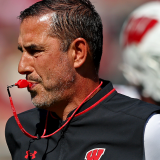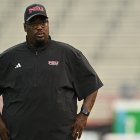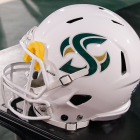How Tennessee stacks up to powerhouse 2019 LSU as No. 1 Vols set sights on first national title since 1998
Tennessee hopes to reach the same national championship destination as that dominant LSU squad
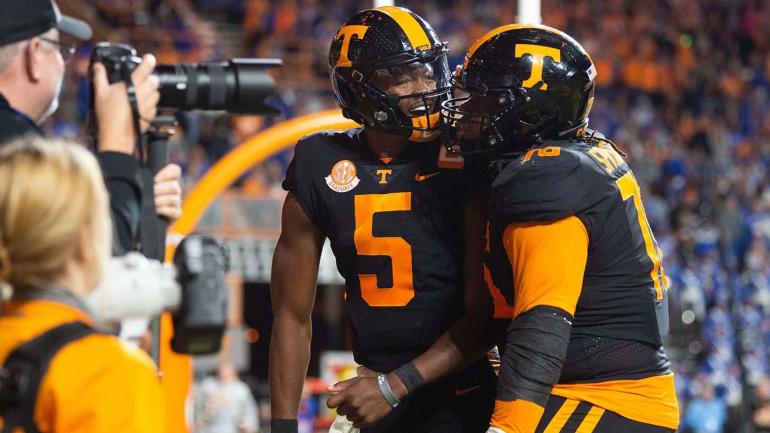
Don't look now, but it's starting to feel like '98 in Knoxville. No. 1 Tennessee is putting together a season for the ages in coach Josh Heupel's second campaign. The Volunteers knocked off Alabama for the first time in 16 years and debuted at No. 1 in the initial College Football Playoff Rankings released Tuesday evening.
The start sets up a unique Game of the Century against Georgia, which is ranked No. 3 in the CFP Rankings but No. 1 in the AP Top 25 with Tennessee in the No. 2 spot. The Bulldogs are the reigning national champions and have been a thorn in the Vols' side since Kirby Smart took the job in 2016.
This Game of the Century featuring a pair of No. 1 teams in different rankings -- or teams raked No. 1 and No. 2 -- has obvious parallels to the last Game of the Century between Alabama and LSU in 2019. Like Tennessee this season, LSU came out of virtually nowhere to jump from solid, competitive program to legitimate national championship contender behind a breakout senior quarterback. And like the Vols this year, those Tigers played the bitter rival Crimson Tide on the road in its ninth game of the season coming out of the first CFP Rankings in a matchup that kick-started LSU's national title run.
Since the inception of a consensus national championship game with the BCS in 1998, there has never been a team that started the year unranked in the AP Top 25 yet went on to win the championship. In fact, no unranked team has won an NCAA-recognized national championship since Georgia Tech took a split crown in 1990.
Will Tennessee become the first to do it in 32 years? Let's just say the comparisons between this team and 2019 LSU do not stop at scheduling.
Explosive passing games
LSU's passing offense in 2019 went down as perhaps the best of all time. Quarterback Joe Burrow threw for a record 5,671 yards and 60 touchdowns, while wide receivers Ja'Marr Chase and Justin Jefferson posted more than 1,500 yards receiving and 18 touchdowns.
Tennessee QB Hendon Hooker's 292.3 yards passing per game trails Burrow by a substantial margin, but his 40 yards rushing per game and a 21-1 touchdown-to-interception ratio helps close the gap. Where the comparison really holds water is the deep passing game where the Vols have been lethal.
Tennessee holds the national lead with 19 passing plays of 40+ yards through eight games. No one else has more than 13 such plays. Burrow's LSU trailed Memphis with 24 such plays in 15 games but led the nation with 15 plays of 50+ yards.
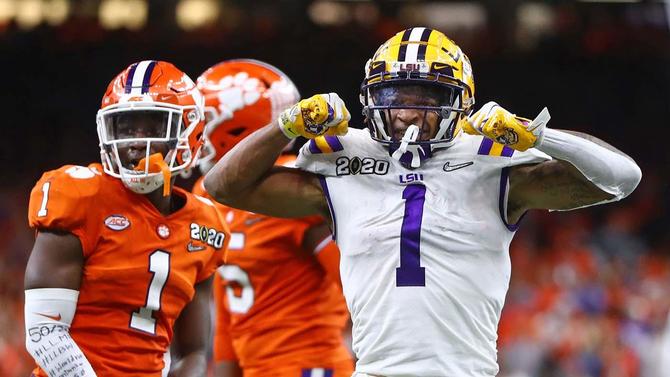
In their upset victory over then-No. 3 Alabama, Tennessee strung together touchdown passes of 78 and 60 yards to WR Jalin Hyatt alone. Hooker will likely need to spread the ball around more against a stout Georgia defense that has given up just six pass plays longer than 40 yards all season.
Where these teams differ thus far is in target share. Burrow's top two receivers, Jefferson and Chase, were targeted on 46.2% of throws. Hyatt and Bru McCoy sit at barely 41% with third and fourth WRs Cedric Tillman (who has missed time with injuries) and Ramel Keyton each nabbing 13% of targets. Burrow also found running back Clyde Edwards-Helaire 64 times in the passing game for 11.5% of targets. Tennessee RB Jabari Small has received just 5.3% of targets.
The Vols don't have the NFL All-Pro-level talents, but they make up for it with a deep stable of receivers who stretch the field. So far, it's worked like a charm.
Difficult schedules
The structure Tennessee's schedule has been surprisingly similar to that of LSU in 2019. Both teams had a light nonconference slate with one major test: No. 9 Texas for LSU and defending ACC champion Pittsburgh for Tennessee. Both opponents went on to slide out of the rankings, but the high-profile wins still boosted the resumes.
Tennessee beat now-No. 10 LSU in dominant fashion before picking up a signature victory over now-No. 6 Alabama, 52-49, snapping a 16-year losing streak in the latter series. LSU beat then-No. 7 Florida and then-No. 9 Auburn by a combined 17 points before heading into its signature matchup.
LSU tore through its five Power Five opponents by an average of 15.0 points per game. Tennessee has pulled off wins by a combined 16.0 points per game. However, blowout victories over Kentucky and LSU helps mask three games that finished within one score.
Tennessee's Power Five competition averages 29.8 in the Sagarin Ratings. LSU's Power Five competition through eight games ranked 39. Alabama this year (2) was the highest-ranked team on the board, though LSU played three teams in the top 15. The competition is surprisingly similar.
Defenses step up when it counts
LSU's defense in 2019 will certainly won't go down as one of defensive coordinator Dave Aranda's best units. The Tigers fell from No. 12 to No. 31 in total defense and No. 14 to No. 32 in scoring defense over a two-year period. A defense working alongside a quick-strike offense is never going to put up strong raw numbers.
Tennessee ranks No. 26 in scoring defense at 21.0 points per game allowed. The total defense numbers look ugly, but per-play stats help contextualize that the Vols are in the same range as Kentucky and ahead of Texas A&M. If they can keep up that production, that's good enough. Where these defenses really deserve a comparison is playing situational football.
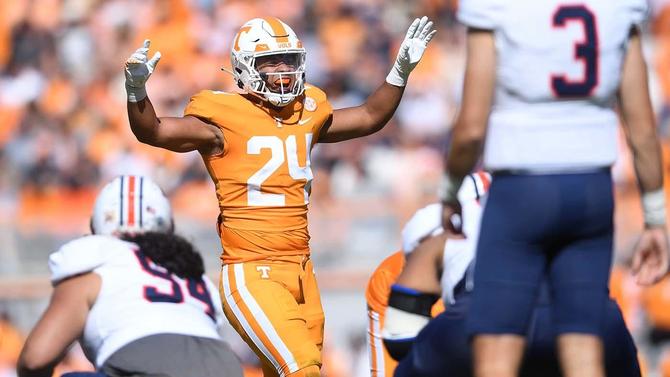
On third downs, both of these teams are exceptional. Tennessee ranks No. 18 nationally allowing teams to convert just 30.7% of attempts. Against Kentucky in Week 9, the Vols held the Wildcats to 2 of 13 on third down in a 44-6 victory. LSU was even better three years ago, holding opponents to 63 conversions on 213 attempts, a rate of 29.6%. In the CFP alone, LSU held opponents to 6 of 24 on third down. Getting offenses off the field is far more important than preventing yardage with these team structures.
Sometimes, it's also better to be lucky than good. LSU raked in a +10 turnover differential, good enough for 15th in the country. Tennessee sits at +8 through eight games thanks to Hooker's care with the football. Seven players have nabbed an interception on defense, including a pair of picks from fifth-year defensive back Trevon Flowers. Stealing a possession is the most valuable commodity for a defense playing alongside a hurry-up Heupel offense.
A significant difference: depth
To win a national championship, a program historically has to reach a certain level of talent known as the Blue-Chip Ratio, which was developed by 247Sports' Bud Elliott. Over the course of the previous four recruiting classes, a team must sign more four- and five-star recruits than two- and three-star recruits to clear the 50% threshold of blue-chip players on campus.
LSU easily cleared this mark heading into 2019 with more than 60% of its roster consisting of blue-chip talent, including seven five-star signees. Several of the best players on the team were high-end recruits, including superstar freshman All-American cornerback Derek Stingley. Others were much lower, like No. 2164 overall recruit Justin Jefferson.
However, the BCR isn't a measure of high-end talent. It's a measure of depth. It's knowing that if starters get hurt, highly recruited backups like Trey Palmer (Nebraska), Siaki Ika (Baylor) and Eric Monroe (Texas Tech) -- players that can transfer and become leading starters elsewhere -- can step in. Fourteen LSU players were ultimately selected in the 2020 NFL Draft, including 10 in the first three rounds. That's depth.
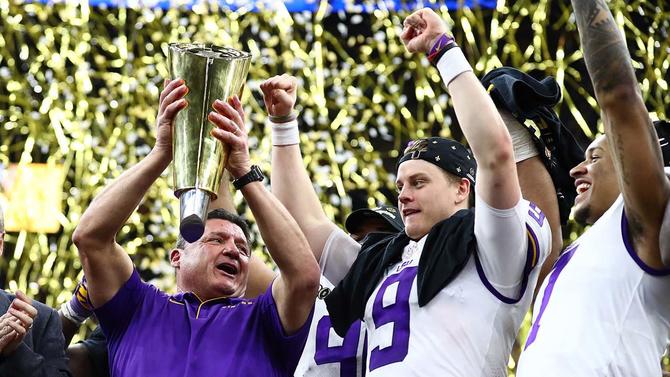
Heading into 2022, Tennessee had a BCR of 45% making it the first team outside of the rankings. At that number, it takes just one more strong class to get to the top mark. With 12 blue-chip commits out of 22 in the Class of 2023, it likely will shift next year. Additionally, a number of the blue-chip signees on campus are upperclassmen, which helps bridge the gap. Hooker, McCoy and Brandon Turnage rank among the high school blue-chip recruits that transferred in and are therefore not counted in the BCR.
The roster also features 19 redshirt seniors, including a handful of sixth-year players, something the BCR was not built to address. Regardless, the depth will be put on full display in the closing stretch of a physically brutal SEC schedule.
Elliott always writes a caveat into his BCR analysis: "At some point, a team with maybe a high 40s number, a transcendent QB, and great injury luck will bust this. It's bound to happen. This almost happened in 2014 with Oregon and Marcus Mariota. An extremely talented Cincinnati team with a record nine players drafted made the [playoff] but was two wins away from winning it all."
Hooker is playing like a transcendent quarterback and Tennessee's numbers are close. The Vols still belong in the discussion. They'll just have to thread a tighter needle.
Will Tennessee walk the path?
Let's put one thing to rest: Hooker is not Burrow. For my money, Hooker should be the clubhouse leader for the Heisman Trophy, but Burrow put together one of the best seasons in the history of organized sports in 2019. Tillman, McCoy and Hyatt are NFL players, but Chase and Jefferson made up perhaps the deadliest receiving combo of all time.
The goal, though, isn't being the greatest team of all time. It's being the greatest in 2022 -- getting to and hopefully winning a national championship. The Vols just need to know if they have a shot. If the similarities to the Tigers continue through the final third of the season, Tennessee can absolutely capture the crown. There's one other way that UT compares favorably to the great 2019 LSU team. If the Vols hold the oblong trophy at season's end, they will have earned it. If Tennessee beats Georgia, it will set up a rematch against Alabama in the SEC Championship Game where Nick Saban has not lost since 2008. Then, a hypothetical CFP could slot Tennessee against No. 4 Clemson in the semifinal and No. 2 Ohio State in the national championship game. An undefeated season would involve No. 1 Tennessee beating No. 2 Ohio State, No. 3 Georgia, No. 4 Clemson, No. 6 Alabama twice and No. 10 LSU. That's a nearly unprecedented murderer's row.
History is littered with cute stories that couldn't finish the job. Mississippi State captured the first-ever No. 1 spot in the CFP Rankings in 2014 before ending the year by losing three of four. Oregon did the same in 2021 with two losses by a combined 76-17 against Utah. Texas A&M earned the No. 4 spot in the first 2016 rankings and finished the year unranked.
Snapping a 16-year losing streak against Alabama was the easy part. On Saturday, we will learn if Tennessee is up for the challenge.
Key Stats Through Eight Games
| Statistic | 2019 LSU | 2022 Tennessee |
|---|---|---|
Wins over Ranked Opponents | 3 | 5 |
Scoring Offense | 46.8 | 49.4 |
Yards Per Play | 7.5 | 7.4 |
| Yards Per Play Allowed | 4.7 | 5.2 |
Scoring Defense | 20.0 | 21.0 |
Turnover Margin | +4 | +8 |







